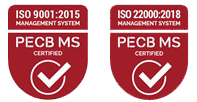Procurement and logistics are two critical functions in any business’s supply chain. Together, they ensure that goods and services are sourced, acquired, and delivered efficiently. While procurement focuses on sourcing the right materials or services at the right price, logistics is responsible for moving these materials through the supply chain.
Both functions play a significant role in keeping businesses running smoothly, improving efficiency, and ensuring customer satisfaction. This blog explores the importance of procurement and logistics and why they are vital for businesses of all sizes.
1. Cost Control and Efficiency
One of the primary benefits of effective procurement is cost control. By selecting the right suppliers, negotiating favorable terms, and optimizing purchase quantities, businesses can reduce the cost of goods or services. This impacts profitability directly, enabling companies to offer competitive pricing while maintaining healthy margins.
Additionally, procurement teams are responsible for ensuring that materials or services are of high quality, minimizing the need for costly returns or replacements.
Logistics, on the other hand, ensures that these materials reach their destination in the most efficient manner possible. This includes optimizing transportation routes, choosing the best modes of transportation, and ensuring timely delivery. Efficient logistics management helps businesses reduce transportation costs, avoid delays, and minimize losses due to damaged goods.
2. Enhances Supply Chain Reliability
Procurement and logistics work hand in hand to build a reliable supply chain. A strong procurement process ensures that businesses have access to reliable suppliers who can consistently meet demand. This is especially important in industries where delays or shortages can halt production, leading to lost revenue.
Logistics ensures that goods move smoothly through the supply chain, from suppliers to manufacturers and then to consumers. By coordinating transportation, warehousing, and inventory management, logistics teams help prevent bottlenecks that could disrupt the flow of goods. Reliable procurement and logistics processes are critical for maintaining steady operations, especially in industries like manufacturing and retail.
3. Improves Supplier Relationships
Procurement plays a key role in developing and maintaining strong supplier relationships. A successful procurement team builds long-term partnerships with suppliers, which can lead to better pricing, improved product quality, and increased reliability. These relationships are beneficial during times of uncertainty, such as when there are supply shortages or market disruptions. Strong supplier relationships can help businesses secure priority access to critical materials, giving them a competitive edge.
Logistics supports these relationships by ensuring that the suppliers’ goods are transported and delivered efficiently. A well-coordinated logistics process allows businesses to build trust with suppliers, as it ensures that materials are handled with care and delivered on time. In turn, suppliers are more likely to continue working with businesses that respect their time and product integrity.
4. Ensures Customer Satisfaction
A business’s ability to meet customer expectations hinges on its procurement and logistics processes. Efficient procurement ensures that the necessary goods or materials are available when needed, enabling companies to meet demand and avoid stockouts. This is crucial for industries like retail and eCommerce, where customers expect timely availability of products.
Logistics plays a crucial role in delivering the final product to the customer. Whether it’s shipping raw materials to a manufacturer or delivering finished goods to a consumer, timely and accurate logistics ensure customer satisfaction. Customers today expect quick and reliable delivery, and any delays or mishandling can lead to dissatisfaction and lost business. Therefore, businesses that excel in both procurement and logistics are better positioned to maintain strong customer relationships.
5. Boosts Business Agility
In today’s fast-paced market, businesses need to be agile. Procurement and logistics allow companies to quickly adapt to changes in the market, whether it’s a shift in customer demand, a disruption in the supply chain, or new competition. Agile procurement teams can quickly source new materials or services, adjust order quantities, and find alternative suppliers when needed.
Similarly, agile logistics systems allow businesses to adjust shipping routes, change inventory levels, and speed up deliveries in response to market changes. This flexibility ensures that businesses can continue to operate smoothly, even during times of disruption, and remain competitive in the market.
6. Supports Sustainability Goals
Sustainability is becoming an important factor in both procurement and logistics. In procurement, businesses are increasingly looking for sustainable suppliers who offer eco-friendly materials or services. This not only supports a company’s sustainability goals but also meets the growing demand from consumers for environmentally responsible products.
In logistics, businesses are exploring ways to reduce their carbon footprint through more efficient transportation methods, optimizing packaging, and using energy-efficient warehousing. Sustainable logistics practices not only benefit the environment but can also lead to cost savings in the long run.


